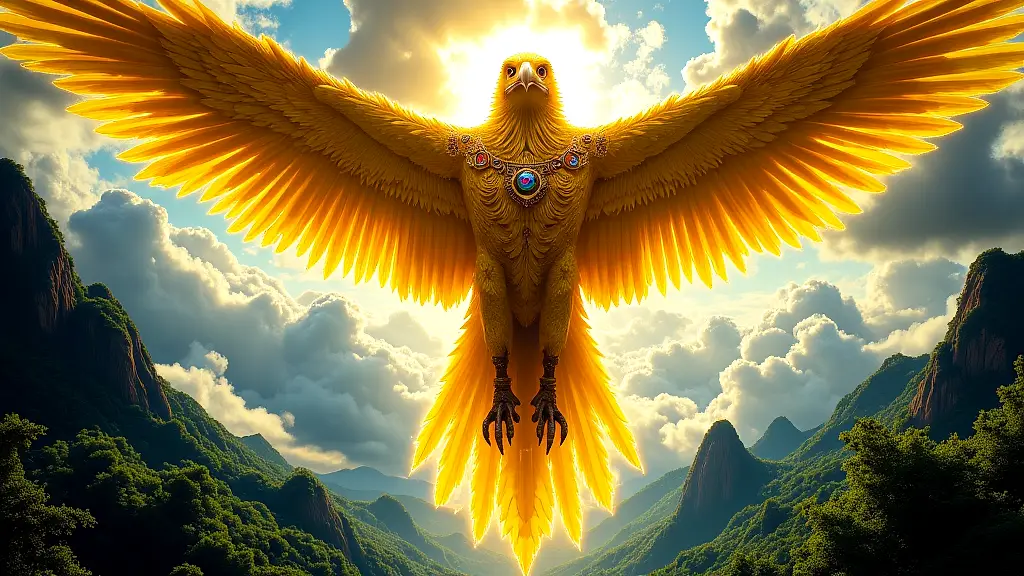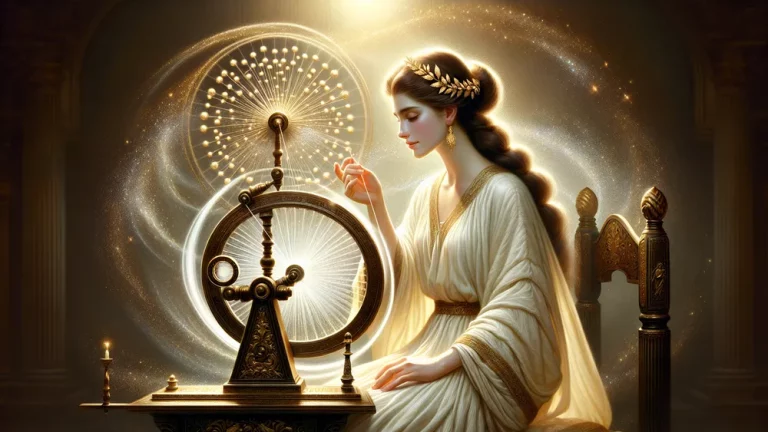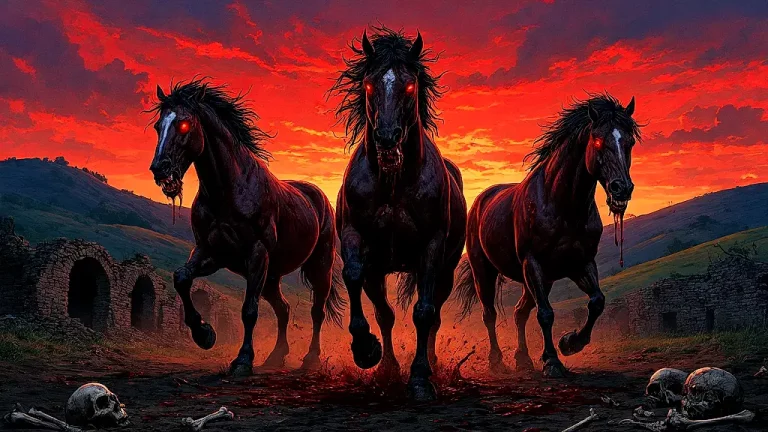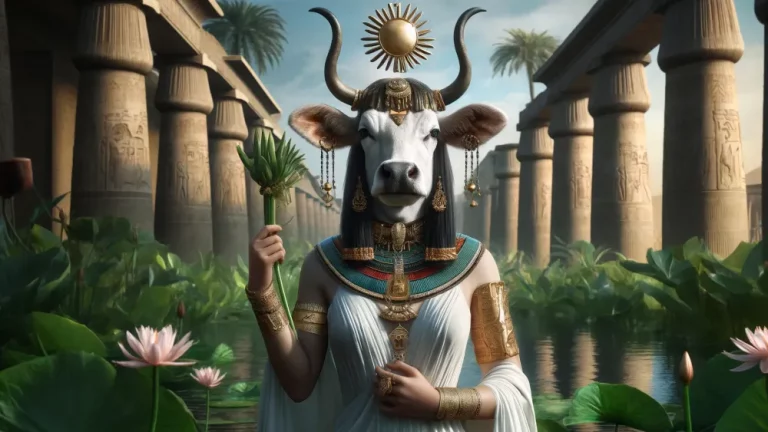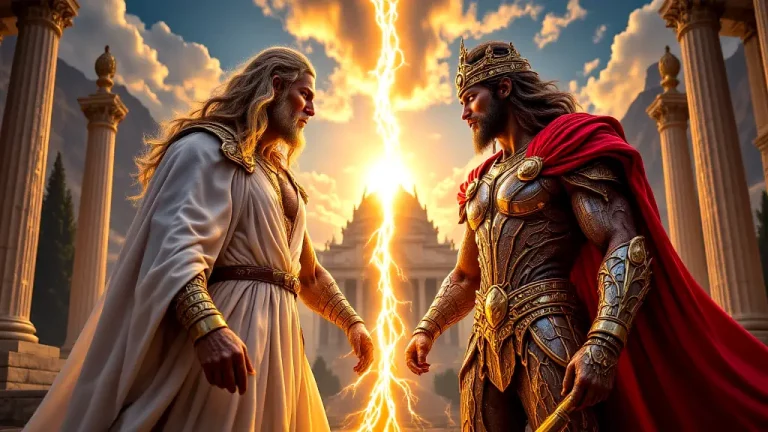Chiuta: The Tumbuka Rain God And Supreme Creator In African Mythology
Think of rain not just as weather, but as something controlled by Chiuta, a god who uses a bow to shape the skies. In Tumbuka mythology, Chiuta is the supreme creator and rain god. The Tumbuka people of Malawi, Zambia, and Tanzania honor him. His name means Great Bow, which reflects his dual role. He brought order to the world and commands storms to give life.
Key Points:
- Chiuta is the Tumbuka rain god and top creator, known as the Great Bow for his power over storms.
- He made the world from chaos, shaping the sky, land, and first humans from clay near Lake Malawi.
- Lightning and rainbows mean his presence, with the bow standing for justice and the rainbow linking sky and earth.
- Sacred animals like pythons and eagles carry his messages or warn of weather changes.
- Stories tell how he punished greed by stopping rain and broke the moon’s light for rebelling.
- People still honor him with rain dances, offerings at Lake Chiuta, and prayers on Mount Mulanje.
- Though beliefs have shifted, some Tumbuka communities keep old traditions like first-fruit sacrifices for rain.
Chiuta is like Zeus or Orunmila, but he has his own stories. He represents power and kindness in Tumbuka culture. His lightning is a sign of justice, and pythons are sacred in his worship. Even today, communities still celebrate him. If you love mythology or are just curious, you’ll find this interesting. These stories show how the Tumbuka see balance in the universe.
Chiuta creates rainbows and brings rain. Let’s explore his legacy step by step.
Chiuta: Overview and Key Facts
| Aspect | Details |
|---|---|
| Name Meaning | Great Bow, which shows his control over rain and lightning. |
| Primary Role | The highest god in Tumbuka belief, ruling over rain and creation. |
| Other Names | Some nearby groups, like the Chewa, call him Chauta. |
| Symbols | – Bow: It stands for lightning and his power as a god. |
| – Rainbow: Shows his promise to humans, linking sky and earth. | |
| Domains | Sky, rain, creation, fertility, and fairness in justice. |
| Sacred Animals | – Python: It represents fertility and helps the earth renew itself. |
| – Eagle: Delivers his messages and flies between worlds. | |
| Cultural Region | The Tumbuka people, mainly in Malawi, Zambia, and Tanzania, worship him. |
| Key Myth | He created the world out of disorder, and some stories say he made humans from clay. |
| Modern Relevance | People still call on him in rain rituals, though some traditions have changed over time. |
Chiuta: The Great Maker and Rain Bringer
To understand Chiuta’s power, we should look at his two main roles. He creates living things and controls the storms.
Chiuta’s Two Sides
Chiuta has two main powers that define him. As the Great Maker, he formed the universe from nothing, creating the sky and everything in it. As the Rain Bringer, he provides what living things need, bringing rain that gives water to the land and its plants. The Tumbuka people see these powers as connected, since together they bring both structure and nourishment to the world.
His important symbols show this double nature:
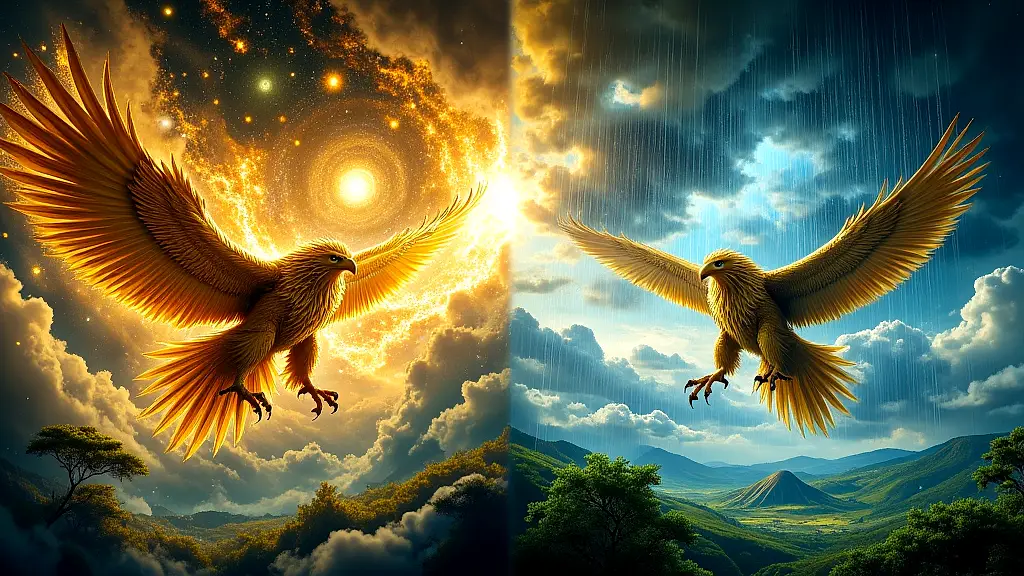
- The Bow: He uses it to send lightning, showing his control over storms and fairness.
- Rainbow: It connects the sky world to ours and appears when rain brings new growth.
- Lightning: This can start life but also punishes those who do wrong.
Note: Different stories stress either his rain-giving side or his world-creating power, just like the weather he controls changes over time.
Chiuta shapes the world by creating it and keeping it alive with rain, using lightning and rainbows to balance life and justice.
How Chiuta Shaped the World
In the beginning, there was only dark water everywhere – what the Tumbuka call mphepo ya mtendere, meaning the wind of confusion. From this, Chiuta appeared as a powerful force that created separate spaces. He made the sky cover everything and formed solid ground below. Some say this took seven days, while others believe it happened instantly, showing how stories change over time. Chiuta didn’t just make the world – he designed it carefully.
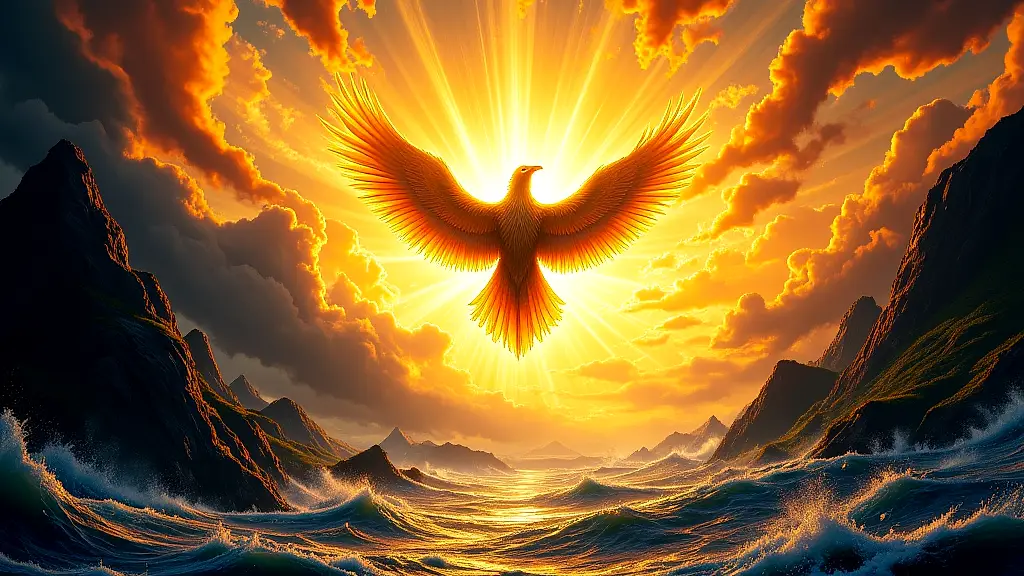
He created valleys to hold water and mountains that reach high. Rivers were placed intentionally to support life. According to many stories, he formed the first humans from white clay near Lake Malawi and gave them moyo (life force). Unlike gods who leave after creating, Chiuta stayed involved through rain, plant growth, and seasonal changes.
The creation followed a clear pattern:
- Separation: Dividing the formless mass into sky, land, and water
- Ordering: Setting up nature’s rules like seasons
- Animation: Adding life energy to creatures
- Instruction: Showing humans how to care for the land
This story explains Tumbuka beliefs about balance, how things connect, and respecting nature – ideas that still guide their farming today.
Animals Linked to Chiuta
The Tumbuka see animals as important. They connect people to spiritual things and represent Chiuta on earth. Each animal shows different parts of Chiuta’s power, whether bringing messages, marking seasons, or demonstrating life’s patterns. This shows Chiuta’s influence appears throughout nature.
| Animal | What It Represents | Why It Matters |
|---|---|---|
| Eagle | Message carrier | Takes prayers to Chiuta; how it flies can mean good or bad news |
| Python | Fertility symbol | Linked to the land’s ability to grow things; harming one may cause dry weather |
| Rainbird | Rain predictor | Its call tells when rain will come; acts like Chiuta’s weather signal |
Note: Some places use the hornbill instead of the rainbird to predict rain.
In certain areas, people also connect the python to their ancestors.
Chiuta in Tumbuka Stories
Besides creating the world, Chiuta appears in many stories. Tumbuka elders have shared these tales for many years.
The Time Rain Disappeared
A Tumbuka village once stopped sharing food with others. They also forgot to give offerings to Chiuta. Because of this, the rain stopped coming. The crops were dying from lack of water. The ground became dry and people grew hungry. Some say this lasted seven months, while others say it continued until the village elder became old. This shows how stories have different versions.
Chiuta wanted to teach them something important about sharing. The rainbird no longer called. The python stayed hidden underground. Even the eagle stopped carrying messages. In some stories, Chiuta came as a traveler who was refused food. In others, he spoke through a dying tree. The message was clear: people must share to prosper.
The village fixed the problem in three ways:
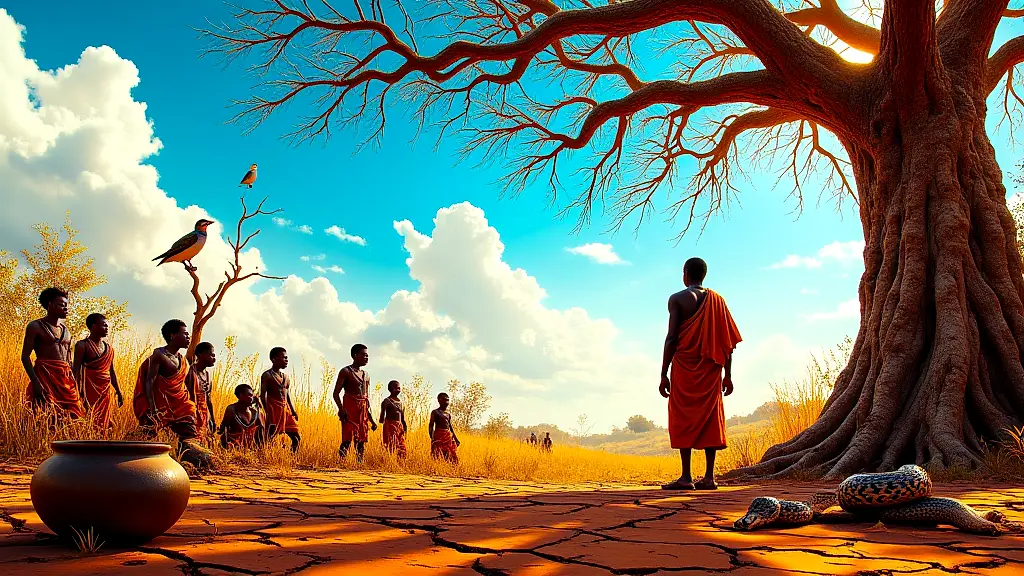
- Collective confession: Leaders admitted they had kept too much food
- First-fruit sacrifice: They burned some of their first harvest as an offering
- Water libation: They poured beer on dry land to ask for rain
People still tell this story because it connects to real farming traditions. Many Tumbuka farmers still burn part of their first harvest. They do this to remember that nature provides for everyone.
Chiuta and the Moon’s Rebellion
At first, Chiuta’s light was everywhere all the time. The moon, which was much dimmer, became jealous of all the attention. Some stories say it tried to take over with help from the stars. Others claim it stole pieces of Chiuta’s light to make itself brighter. All versions agree that one night, the moon grew very large. Its light became painfully bright as it demanded equal worship. Chiuta responded with powerful force.
A loud thunderclap broke the moon’s stolen light into pieces. Because of this event, the moon now constantly changes shape as it tries to regain its full brightness. Chiuta didn’t destroy the moon completely. He gave it a new job instead – to watch over the night with reflected light. This explains why some Tumbuka people are careful during full moons.
They remember the moon’s failed rebellion when they see its bright light.
The moon tried to outshine Chiuta but got shattered into pieces, forcing it to now reflect light and never regain its full brightness.
How People Honor Chiuta
The Tumbuka people respect Chiuta through stories and daily practices. Their ceremonies help maintain this important connection. Because these traditions continue, they show how old beliefs affect modern life. Many community members still follow them today.
Ceremonies to Call for Rain
When rain is late, Tumbuka villages hold special rain-calling ceremonies. Elders wear blue cloth, the color of water, and move like clouds. Their feet move in circles that represent how water moves in nature. Drummers play a three-beat rhythm said to copy the sound of Chiuta walking. The music starts quiet, then gets much louder. In some places, girls carry water pots on their heads during the dance.
This shows how people and nature connect. At the most important moment, a chosen person climbs a special mound to pray. This person often comes from families of traditional rain priests. The prayers use special traditional words that have been passed down. People say things like “We scatter millet as our ancestors did.” The ceremony reaches its peak when everyone throws white flour into the air.
This looks like clouds and asks for real rain to come. The offerings have deep meaning. Millet beer made for the ceremony shows both sacrifice and giving back. Uncooked millet gets thrown in all directions while people name local rivers. In eastern areas, they add iron smelting slag to show how rain cools both metal and land. These items play an important role in connecting people to nature.
They help continue the relationship between the Tumbuka people and Chiuta.
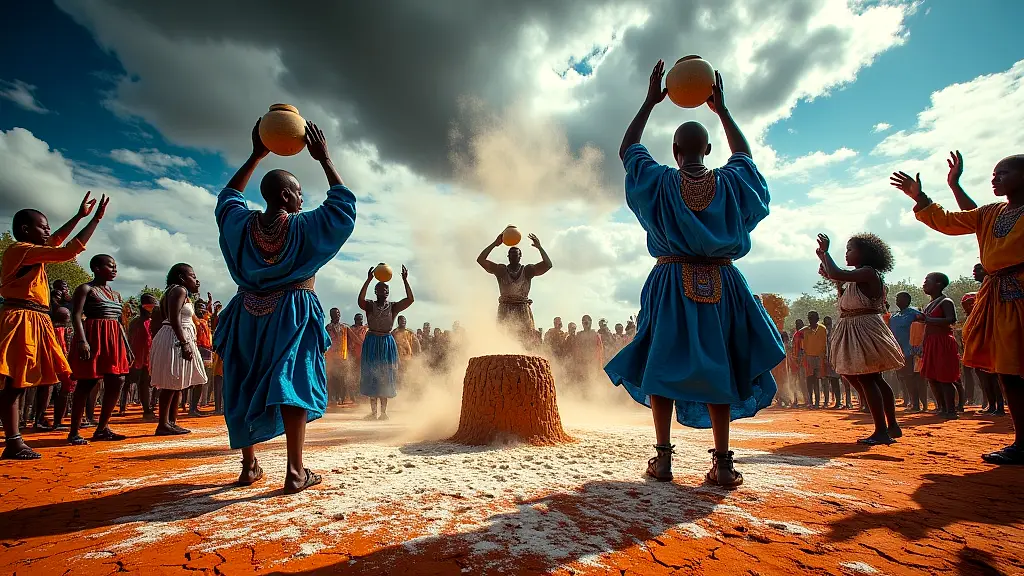
Places of Worship
The Tumbuka people consider some natural places to be very important to Chiuta. Lake Chiuta, which sits between Malawi and Mozambique, is seen as a reflective surface for the god. The water reflects the sky clearly. People believe offerings thrown in go straight to Chiuta. When droughts come, whole villages stay by the lake. They float small reed boats with millet cakes toward the deep center.
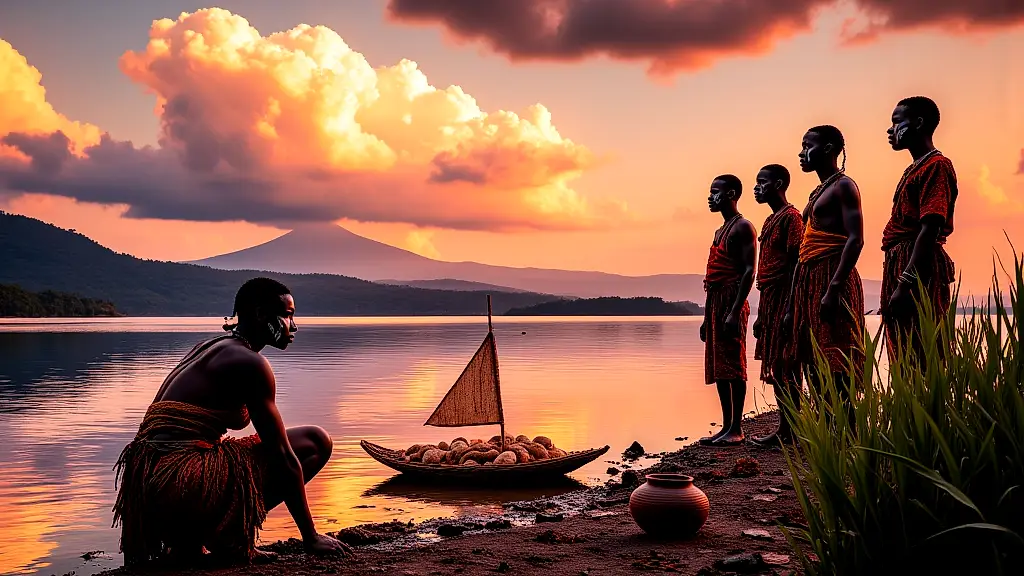
Another holy place is Mount Mulanje. People climb to special rocks that make echoes. Locals say these carry prayers to the sky. Both locations have their own traditions:
- Lake Chiuta:
- Rainbow ceremonies when sunlight hits the water
- Silent fishing – a quiet fishing method where people release their catch
- Mount Mulanje:
- Cloud-catching with cloths at dawn
- Echo rituals using chants between rocks
- Summit fire offerings when planting begins
These practices show how the Tumbuka people connect with nature and their god. Each ritual has specific steps that people follow carefully.
The Tumbuka Pantheon
Chiuta is the main god in Tumbuka belief, but there are many other gods and spirits. They control different parts of life and nature. If you want to see how Chiuta connects to other African gods, check this list of all the African Gods. It shows all the different local groups of gods and how their stories connect.
FAQs
1. Is Chiuta still worshipped today?
Chiuta is still worshipped today, particularly among the Tumbuka people in Malawi and Zambia during traditional rain-calling ceremonies.
2. How does Chiuta compare to other African sky gods?
Compared to other African sky gods, Chiuta uniquely combines the roles of supreme creator and rain-bringer, emphasizing his dual sovereignty over both cosmic order and earthly fertility.
3. What’s the significance of Chiuta’s bow?
The significance of Chiuta’s bow lies in its representation of his divine authority to summon rain and wield lightning as the supreme sky god.
4. Are there modern festivals for Chiuta?
Modern festivals for Chiuta still exist, particularly in Malawi, where traditional rain-calling ceremonies persist among the Tumbuka people.

